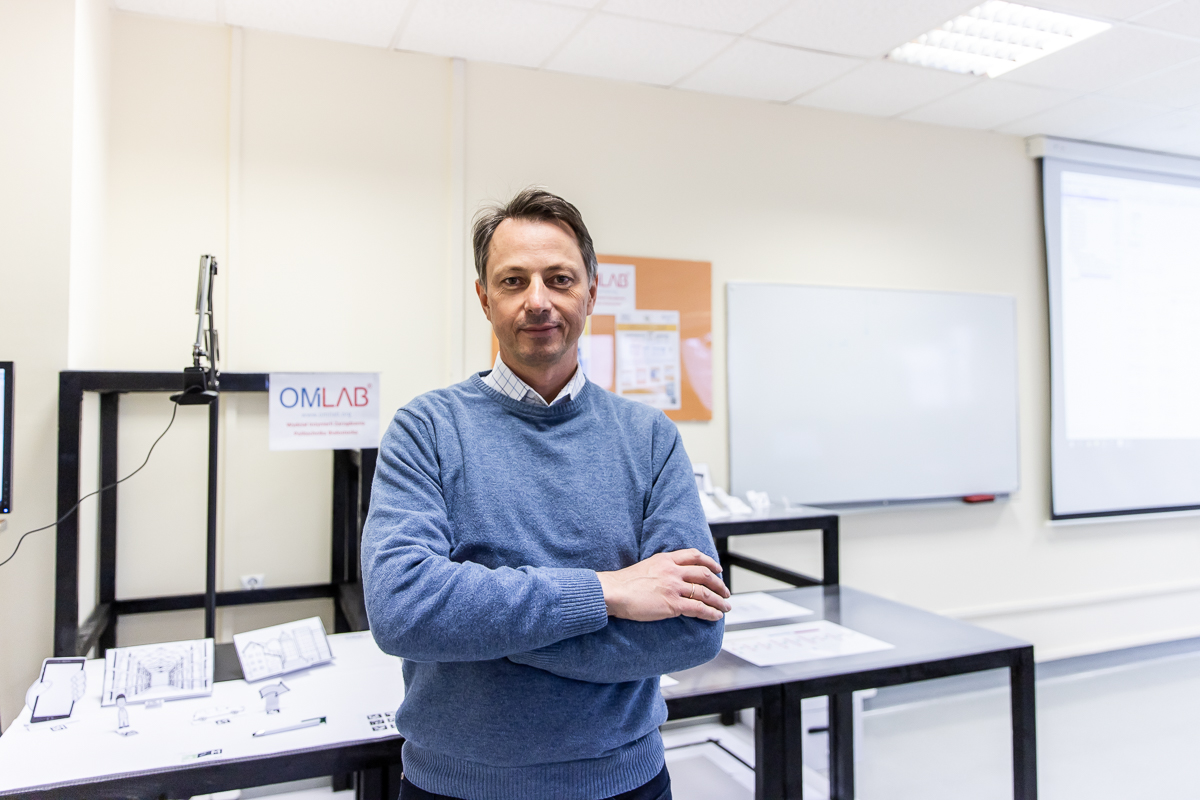OMiLAB4FoF laboratory at the Faculty of Engineering Management
21-12-2021
Launching an innovative laboratory and using it in the teaching of students and trainings of employees of enterprises is a measurable benefit resulting from the participation of Bialystok University of Technology in the international project “The FoF-Designer: Digital Design Skills for Factories of the Future”.
The project brought together universities and business partners from Finland, France, Germany, Poland, Portugal, Romania and Italy. The DIGIFOF project was implemented and financed within the framework of the Erasmus+ Action 2: Cooperation for Innovation and Exchange of Good Practices – Knowledge Alliances. The activities of the consortium consisting of 15 institutions was coordinated by the University “Lucian Blaga” in Romania. On the Polish side, the project partners were the Faculty of Engineering Management of Bialystok University of Technology, the Centre for the Promotion of Innovation and Development, representing the Metal Processing Cluster and BOC Information Technologies Consulting, member of the BOC group. The value of the project amounted to nearly EUR 1 million.
Consortium members first carried out a diagnosis of the needs of companies in five EU countries, and then developed innovative teaching and training materials, based on ICT tools and case studies from industry. They also established a network of training environments – the OMiLAB4FoF laboratories. One of them was created at the Faculty of Engineering Management of Bialystok University of Technology.
– This laboratory was created primarily to meet the needs of our students to enrich their skills in process management, modelling and process design. The laboratory is also the result of a long-term cooperation between the Faculty of Engineering Management and the Metal Processing Cluster. Companies of the cluster are intensively preparing to implement the guidelines of Industry 4.0 and see the need to develop new competencies of their employees – explains Arkadiusz Jurczuk, PhD, Eng, coordinator of the DIGIFOF project from Bialystok University of Technology.
The OMiLAB4FoF laboratory can be used for professional training and teaching practical skills in the field of multifaceted design of the factory of the future.
– We use Scene2model, Bee-Up, ADOxx Modelling, ADOxx Development, Adonis software. These are tools not only for educational purposes, they are also professional business tools. So we learn the methodology, which is directly applicable in business – emphasises Arkadiusz Jurczuk, PhD, Eng.
More than 20 innovative tools are also available to support the design of processes for FoF (Factories of the Future). The DIGIFOF project developed training curricula and teaching materials, based on modern ICT tools and case studies, which reflected the real needs and problems of contemporary enterprises. This was possible thanks to a diagnosis of the real needs of enterprises from seven European countries, including clusters of manufacturing enterprises.
Within the DIGIFOF project, 26 webinars were organised on key areas referring to development of factories of the future. They were attended by more than 380 representatives of science, business and students from many countries. Specialised FoF-design training courses were conducted with nearly 300 participants.
The initiative contributed to improving the digital competence of project stakeholders in FoF-design. The interdisciplinarity of the DIGIFOF consortium also enabled international knowledge transfer, experience exchange and support for the development of skills in the design, automation and mechanisation of enterprise processes.
– Participation of Bialystok University of Technology and the Metal Processing Cluster in the project influenced the promotion of our region in the international industry environment. The active participation of our specialists in the development of tools supporting the partnership between business and science is also important. A huge advantage is the creation of an educational centre in Bialystok, which is to promote and implement digital transformation – says Arkadiusz Jurczuk, PhD, Eng.
“The FoF-Designer: Digital Design Skills for Factories of the Future” project fiche
Information and project resources can be found at: digifof.eu
Project implementation date: 1.01.2019 – 31.12.2021.
Project value of nearly EUR 1 million
Source of funding: Erasmus+ Action 2: Cooperation for Innovation and Exchange of Good Practices – Knowledge Alliances.
Members of the BUT project team: Alicja Gudanowska, PhD, Julia Siderska, PhD, Eng
Consortium members:
University of Vienna, Austria;
University of Oulu, Finland;
Ecole Nationale Supérieure des Mines de Saint Etienne, France;
CLEXTRAL, France;
ViaMéca, France;
International Centre for Resources and Innovation for Sustainable Development, France;
University of Bergamo, Italy;
Bialystok University of Technology, Poland;
BOC Information Technologies Consulting Sp. z o.o., Poland;
Metal Processing Cluster (through the partnership of the Centre for the Promotion of Innovation and Development in the project), Poland;
Society of Collaborative Networks, Portugal;
Metal Manufacturing Transilvania Cluster, Romania;
Continental Automotive Systems S.R.L., Romania;
Lucian Blaga University of Sibiu, Romania.









